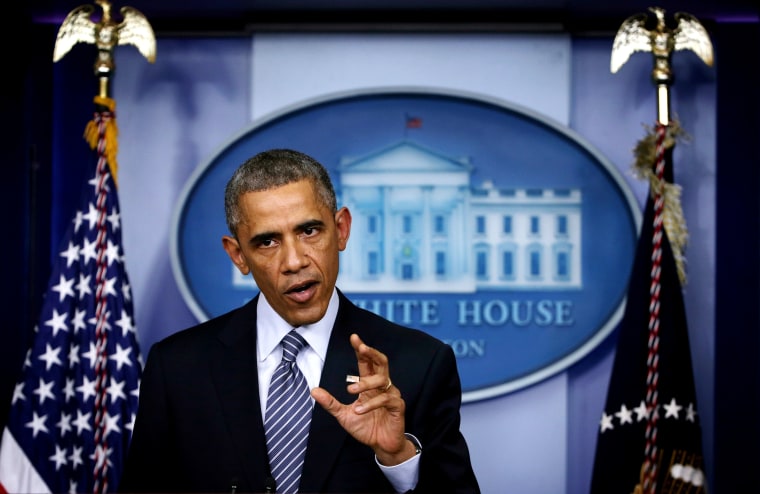As world leaders gathered in Paris to show their support for the French in the wake of the Charlie Hebdo attacks, the White House on Sunday announced it would convene a Summit on Countering Violent Extremism in February to discuss ongoing threats from terror groups.
Attorney General Eric Holder, who was in France, said on NBC’s "Meet The Press" that the United States was “at war with terrorists,” who he said “use a corrupted version of Islam to justify their actions.”
"We are bound and determined to hold them accountable, to find them wherever they are, and then to try ... to come up with ways in which we prevent young people who become attracted to this radical ideology from becoming members of these groups and perpetrating these heinous acts," Holder said.
Related: Video of Paris gunman raises new concern
The State Department issued a global warning to Americans the same day to “maintain a high level of vigilance” against terrorist attacks while traveling abroad, which they fear could become more common as European citizens who have traveled to the Middle East to fight for the Islamic State of Iraq and the Levant (ISIL), currently the target of American airstrikes, return home with weapons training and combat experience.
The multi-day spree of violence in France fits into a new model of post-9/11 terrorism in which radicalized residents of Western countries are inspired or trained by foreign Islamic extremist groups to carry out terrorist attacks in their home countries. In the United States, Dzhokhar Tsarnaev is currently on trial for allegedly carrying out a bombing at the 2013 Boston Marathon with his brother Tamerlan Tsarnaev, who was killed by police, in an incident that has parallels to the Paris attacks.
While authorities say they’ve made great gains disrupting al Qaeda and neutralizing its leaders since 2001, regional offshoots and individuals influenced by their rhetoric and agenda still pose a serious danger. In France, one of the suspected Charlie Hebdo shooters, Cherif Kouachi, told a French television station, BFM, that he had been sent by al Qaeda’s Yemen branch after meeting with Anwar Al-Awlaki, a radical American-born cleric killed by a drone strike in 2011. Tsarnaev reportedly told authorities he and his brother were influenced by Al-Awlaki’s message.
“I don’t think there’s any question we have certainly decimated core al Qaeda,” Holder told NBC News. “The threat now really comes from Al Qaeda affiliates.”
The terror in France began on Wednesday as three masked gunman stormed the office of Charlie Hebdo, a satirical newspaper that had faced previous threats over its mocking depiction of the Prophet Muhammad and was even firebombed at one point. The next day, a policewoman was shot in what French authorities believe was a connected shooting. On Thursday, an additional gunman took hostages at a kosher supermarket while two brothers suspected in the Hebdo massacre took a hostage at a printing facility. All three attackers were killed in simultaneous commando raids, but not before four people were dead at the grocery store. The third suspected Hebdo shooter turned himself in to authorities earlier while a suspected female accomplice, Hayat Boummeddiene, is still at large.
